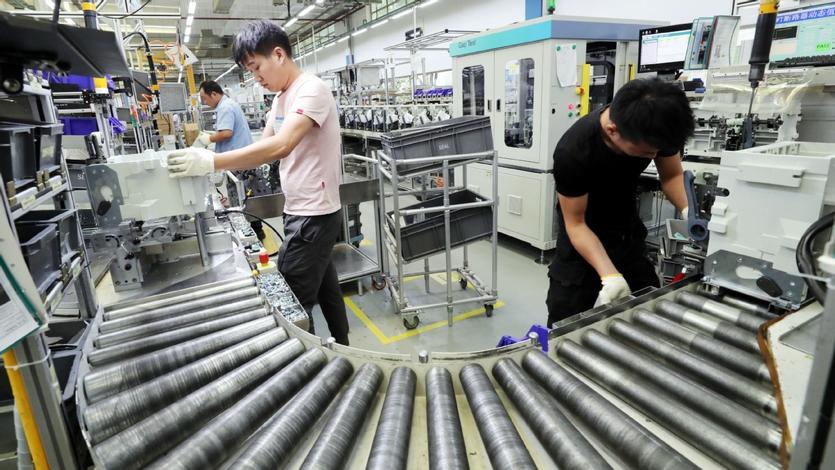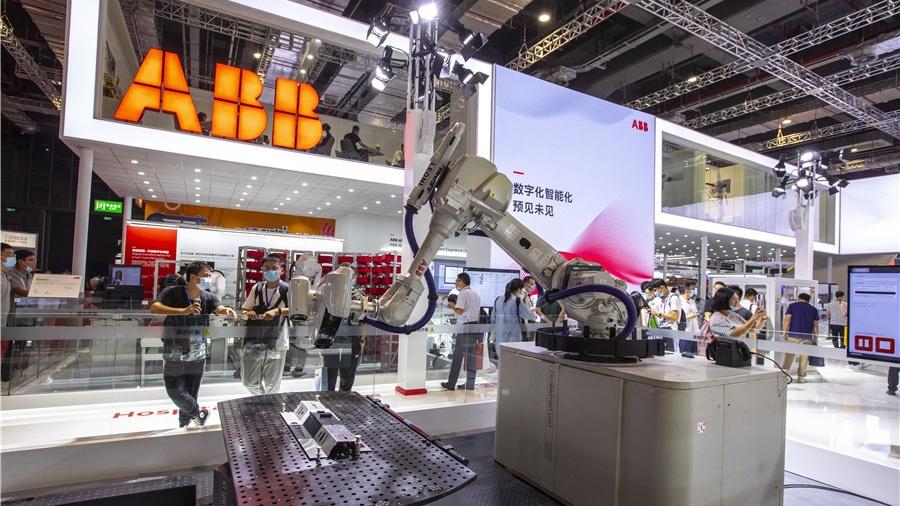 In this undated file photo, employees work on an electronics production line of Siemens in Suzhou, Jiangsu province. (PHOTO BY HUA XUEGEN / FOR CHINA DAILY)
In this undated file photo, employees work on an electronics production line of Siemens in Suzhou, Jiangsu province. (PHOTO BY HUA XUEGEN / FOR CHINA DAILY)
China's efforts to build an institutional system conducive to high-level opening-up and to seek to join high-standard economic and trade deals will further boost market expectations and the confidence of global companies in 2023, market observers and corporate executives said on Monday.
The remarks emerged in response to a series of pro-growth policy measures outlined by top policymakers during the tone-setting Central Economic Work Conference, which pledged to make greater efforts to attract and utilize foreign capital, widen market access, promote further opening-up of modern service industries and grant foreign-funded enterprises national treatment.
The meeting, which concluded on Friday in Beijing, said that China will actively seek to join high-standard economic and trade agreements such as the Comprehensive and Progressive Agreement for Trans-Pacific Partnership and the Digital Economy Partnership Agreement.
Despite external uncertainties, China's policies to boost domestic demand and take follow-up measures to stabilize the economy will continue to attract foreign direct investment, as well as ensure the operation of global supply and industrial chains next year, said Gao Lingyun, a researcher at the Institute of World Economics and Politics, which is a part of the Chinese Academy of Social Sciences in Beijing
To reach these goals, China will further adhere to the standard economic and trade rules, create a more market-oriented and law-based business environment, and open even wider to multinational corporations next year, said Zhao Ping, deputy head of the Academy of China Council for the Promotion of International Trade in Beijing.
Despite external uncertainties, China's policies to boost domestic demand and take follow-up measures to stabilize the economy will continue to attract foreign direct investment, as well as ensure the operation of global supply and industrial chains next year, said Gao Lingyun, a researcher at the Institute of World Economics and Politics, which is a part of the Chinese Academy of Social Sciences in Beijing.
The actual use of FDI in China expanded to 1.09 trillion yuan ($156.09 billion), a year-on-year increase of 14.4 percent, during the January-October period of 2022, data from the Ministry of Commerce showed.
ALSO READ:China's business climate boosts foreign firms' confidence
A key report delivered at the opening session of the 20th National Congress of the Communist Party of China stressed that China will make appropriate reductions to the negative list for foreign investment, protect the rights and interests of foreign investors in accordance with the law and foster a world-class business environment that is market-oriented, law-based and internationalized.
"These policies will motivate more global companies to invest in the country," said Zhou Mi, a researcher at the Chinese Academy of International Trade and Economic Cooperation in Beijing.
Willie Tan, chief executive officer (China, South Korea and Southeast Asia) of Skechers, an athletic footwear and apparel company based in the United States, said as China's top leadership had sent a strong message that spurring domestic demand will be a major task of the government in 2023, Skechers will raise the number of its stores across China from around 3,000 this year to up to 6,000 in 2026.
With its high resilience and potential, the Chinese economy will help boost the confidence of a world facing challenges and the country will continue to play an irreplaceable role in global industrial and supply chains, Tan said.
ALSO READ: China strives to safeguard supply chains
 Visitors check out an industrial robot developed by Swiss conglomerate ABB Group at an expo in Shanghai. (PHOTO / CHINA DAILY)
Visitors check out an industrial robot developed by Swiss conglomerate ABB Group at an expo in Shanghai. (PHOTO / CHINA DAILY)
Willie Tan, chief executive officer (China, South Korea and Southeast Asia) of Skechers, an athletic footwear and apparel company based in the United States, said as China's top leadership had sent a strong message that spurring domestic demand will be a major task of the government in 2023, Skechers will raise the number of its stores across China from around 3,000 this year to up to 6,000 in 2026
Eager to seize more market share, Amcor Plc, a packaging solutions provider headquartered in Zurich, Switzerland, opened a new plant in Huizhou, Guangdong province, last week with an investment of nearly $100 million. The factory is the largest flexible packaging plant in terms of production capacity in China, according to Amcor.
"This investment is testament to our commitment to grow with our customers in China and throughout the Asia-Pacific region," said She Xin, vice-president and general manager of Amcor China.
Zhou, from CAITEC, said that increasing investment by multinational companies could render better support for the flow and optimization of production factors, as well as bolster both regional and global trade.
Wilo Group, a German pump system provider, plans to put a new plant into operation in Changzhou, Jiangsu province, next year.
"Once it is operational, our products will supply the Chinese market and be exported to other emerging markets," said Lyman Tu, Wilo's vice-president for China and Southeast Asia.
A stable, transparent and predictable environment certainly can enable the Chinese market to play a better role, and create fresh opportunities for the world, said Jiang Xiaojuan, chairwoman of the Beijing-based Chinese Public Administration Society.
READ MORE: Multinational food firms share opportunities in China's market
Conducting institutional opening-up shows that China's commitment to trade liberalization and facilitation is a long-term solution, Jiang said.


